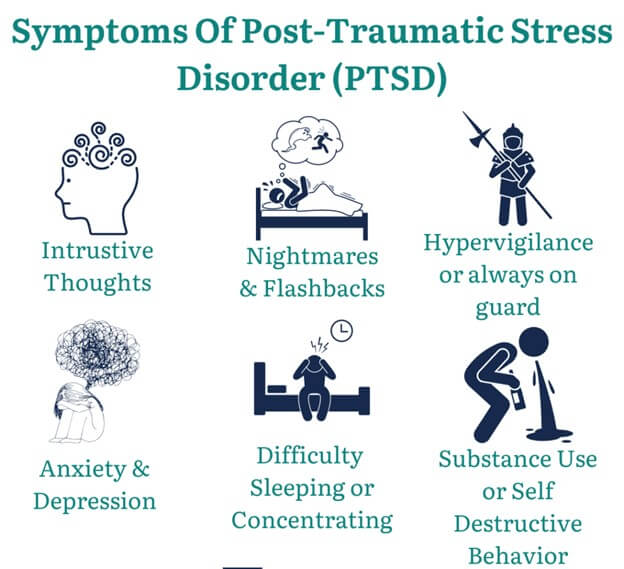A nurse is caring for a client who was involved in heavy combat and observed war casualties. The nurse should suspect that the client is suffering from posttraumatic stress disorder (PTSD) if the client makes which of the following statements?
"My child was born with a birth defect due to an exposure I had overseas."
I check any room I enter because the enemy is still after me and could be hiding anywhere."
"In my dreams, all I can see are the wounded reaching out and trying to grab me."
"I killed four enemy soldiers with my bare hands and saved my entire battalion."
The Correct Answer is C
A) "My child was born with a birth defect due to an exposure I had overseas."
This statement does not directly relate to the core symptoms of PTSD. While exposure to trauma can have a variety of consequences, including potential exposure-related health issues, this statement does not necessarily indicate the re-experiencing, avoidance, or hyperarousal symptoms characteristic of PTSD.
B) "I check any room I enter because the enemy is still after me and could be hiding anywhere."
This statement is more indicative of hyperarousal and hypervigilance, which are common symptoms of PTSD. However, it does not explicitly involve re-experiencing the traumatic event through nightmares or intrusive memories, as described in the correct answer.
C) "In my dreams, all I can see are the wounded reaching out and trying to grab me."
Explanation:
The statement "In my dreams, all I can see are the wounded reaching out and trying to grab me" indicates symptoms commonly associated with posttraumatic stress disorder (PTSD). This statement reflects the re-experiencing symptom cluster of PTSD, where individuals may have distressing and intrusive memories, nightmares, or flashbacks related to the traumatic event they experienced. The imagery of wounded individuals trying to grab the person suggests a strong emotional impact and ongoing distress related to the traumatic experience.
D) "I killed four enemy soldiers with my bare hands and saved my entire battalion."
While this statement might reflect exposure to a traumatic event and could contribute to symptoms of PTSD, it is presented in a way that seems more like a narrative of heroic actions rather than a symptom of distress or re-experiencing.

Nursing Test Bank
Naxlex Comprehensive Predictor Exams
Related Questions
Correct Answer is D
Explanation
A. "I can see that you trust me, but you should share those feelings with your psychiatrist, not me."
While encouraging the client to discuss their feelings with a mental health professional is important, this response does not address the immediate safety concern presented by the client's intent to harm others.
B. "I will not violate our nurse-client relationship. The information we discuss will remain confidential between us."
This response is inappropriate because it implies that the nurse will keep the information confidential, even though the client's statement raises concerns about the safety of others.
C. "Because you are a minor, I have to share any information that I feel is important with your parents."
While parents may have the right to be informed about their minor child's well-being, this situation goes beyond parental involvement. The nature of the threat requires immediate intervention from appropriate professionals and authorities.
"D. I cannot promise that. I must share this information with other members of the team who are responsible for planning your care."
Explanation: The client's statement about having a desire to harm others, especially classmates and a school teacher, raises significant concerns about the safety and well-being of not only the client but also the potential victims. In cases where the client poses a risk of harm to themselves or others, the nurse has a duty to breach confidentiality to ensure the safety of all involved parties. This response conveys the nurse's ethical obligation to involve other members of the treatment team and appropriate authorities to address the potential threat.
Correct Answer is D
Explanation
A. An adolescent client who throws objects at other clients:
Explanation: Seclusion is contraindicated for this client due to safety concerns. The behavior of throwing objects at others indicates a potential danger to both the client and others in a confined space. Placing the client in seclusion could escalate the situation and potentially lead to further harm.
B. An older adult client who is manic and crying due to overstimulation:
Explanation: Seclusion might be contraindicated for this client as well. Older adults experiencing manic behavior and emotional distress could be further traumatized by seclusion. Alternatives like providing a calm and soothing environment, along with appropriate medications, might be more beneficial for this client.
C. A school-age client who attempts to repeatedly bite staff:
Explanation: Seclusion is a potential option for this client. The repeated attempts to bite staff pose a risk of physical harm to both the client and staff members. Seclusion might be used as a last resort to ensure the safety of everyone involved.
D. An adult client following a suicide attempt:
Explanation: Seclusion is generally contraindicated for clients who have attempted suicide. Placing them in isolation can worsen feelings of despair and isolation, potentially increasing the risk of self-harm or suicide. These clients require close monitoring, support, and therapeutic interventions to address the underlying issues.
Whether you are a student looking to ace your exams or a practicing nurse seeking to enhance your expertise , our nursing education contents will empower you with the confidence and competence to make a difference in the lives of patients and become a respected leader in the healthcare field.
Visit Naxlex, invest in your future and unlock endless possibilities with our unparalleled nursing education contents today
Report Wrong Answer on the Current Question
Do you disagree with the answer? If yes, what is your expected answer? Explain.
Kindly be descriptive with the issue you are facing.
